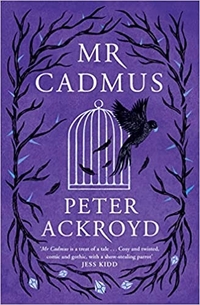Mr Cadmus by Peter Ackroyd
 Monday, September 20, 2021 at 7:07AM
Monday, September 20, 2021 at 7:07AM 
First published in the UK in 2020; published by Canongate Books on September 21, 2021
Most of the story that unfolds in Mr Cadmus follows a British tradition of making murder the undercurrent of a whimsical story. Yet a growing darkness makes the story, by the end, more disturbing than whimsical.
Millicent Swallow and Maud Finch have an aunt in common, but they did not know each other until their teenage years, when the aunt introduced them. They also have murder in common. During their young lives, each killed for reasons they never came to regret. It is likely that neither woman is entirely right in the head, although they seem very proper and well suited to a quiet life in a gossipy village. As the years passed, they became as close as sisters, and by the early 1980s they occupy similar houses on the same street in Little Camborne, “the tiniest dot in a map of the county of Devonshire,” separated only by the house that stands between theirs.
When Theodore Cadmus moves into the middle house, the cousins are concerned. “I hope he doesn’t have any habits,” one cousin says. “Such as what?” the other asks. “Oh you know, food and so forth.” The cousins are quickly charmed by the new arrival, a single man in his 40s from Italy who lavishes the two women with attention and compliments. When reports of crime begin to crop up in the sleepy community and nearby villages, the reader will suspect they might relate to Mr Cadmus. The cousins do not suspect Cadmus of any crime. Surely he cannot be held accountable for the vicar who seems to have purloined the local parish’s property, although Cadmus and the vicar were together in a bank to which Cadmus paid a sudden visit. The cousins believe Cadmus is much too polite to be a criminal, even if his account of his past seems to change from conversation to conversation.
Theodore’s true past begins with a childhood on a small, misty island between Sardinia and Sicily. As a child, he kept his eye open for German soldiers and English spies. He was mistreated by both but had a particularly ugly encounter with a group of Englishmen. That episode gave him a dual purpose: revenge and finding hidden treasure at a location described on a map that a German soldier liberated from one of the Englishmen.
The story is odd and quirky, the kind of story in which the appearance of a parrot with a vulgar vocabulary is not unexpected, although the parrot’s fate might come as a shock. Mr Cadmus begins as an amusing story about eccentric characters who are not what they appear to be. The story eventually takes a darker turn, complete with brutal murders, voices from a grave, and a corpse whose “mouth and nostrils were stuffed with green amethysts so that he could no longer breathe.” The change in tone, complete with legends of a purple seagull, gives the novel a hint of the supernatural. While the change is a bit jarring, the ending is consistent with karma, given that none of the characters deserve to go unpunished.
Readers who want likeable characters and happy endings should avoid Mr Cadmus. Readers who want to be surprised — even if the story makes them cringe a bit — might be nourished by a plot that, if not entirely satisfying, is filled with unexpected events.
RECOMMENDED
 TChris |
TChris |  Post a Comment |
Post a Comment |  Peter Ackroyd,
Peter Ackroyd,  UK in
UK in  General Fiction
General Fiction 